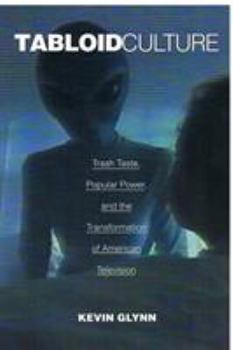Tabloid Culture: Trash Taste, Popular Power, and the Transformation of American Television
(Part of the Console-ing Passions: Television and Cultural Power Series)
Select Format
Select Condition 
Book Overview
During the latter half of the 1980s and throughout the 1990s, television talk shows, infotainment news, and screaming supermarket headlines became ubiquitous in America as the "tabloidization" of the nation's media took hold. In Tabloid Culture Kevin Glynn draws on diverse theoretical sources and an unprecedented range of electronic and print media in order to analyze important aspects and key debates that have emerged around this phenomenon.
Glynn...
Format:Hardcover
Language:English
ISBN:0822325500
ISBN13:9780822325505
Release Date:September 2000
Publisher:Duke University Press
Length:336 Pages
Weight:1.56 lbs.
Dimensions:1.1" x 6.4" x 9.6"
Customer Reviews
1 rating
A Very Illuminating Examination of What Others Fear To Touch
Published by Thriftbooks.com User , 19 years ago
Please do not listen to the other review of this book: it is clearly written by someone who hasn't read Glynn's carefully argued, very interesting examination of "trash" television. "John Q. Public," as he calls himself in the review, seems to make it sound so simple -- networks play things because they get ratings. But what Glynn answers in a way that all of John Q's love for PBS can't is WHY they get ratings. The answer to this question has so often been astoundingly shortsighted and downright insulting: "People watch trash TV because they're stupid, don't know any better, and never will" or something as asinine and simplistic as that. But Glynn digs into the populist in a very interesting way, and what he finds is that these shows frequently validate everyday experiences and knowledge of everyday, working class viewers in ways that many instances of "high culture" on television don't. Glynn's point is not at all about aesthetics or artistic value (as John Q. Public assumes, having not read the book, that it is), as he largely leaves this question for the reader to answer: his point is about not just disregarding all these programs AND all their viewers because one has made such artistic judgements. In "trash" TV, Glynn finds many democratic tendencies. At times, Glynn can overdo it, and at other times, his enthusiasm to defend overlooks, or rushes through, disturbing political content of the shows (such as inherent racism or sexism), but most of the time he is remarkably careful to balance such tensions. This is an academic text, and so may not be ideal for everyone, though it is reasonably accessible. So, if you want to go beyond complaining that such television shouldn't exist, and if you're actually interested in why it does, and why so many people turn to it, I highly recommend this book. I share the reviewer "John Q Public's" regard for PBS, though I feel it has turned its back on many Americans, and on the real John Q Publics, so to speak. Glynn's book looks at what those John Qs are watching and starts to ask the reasons why. (For more on PBS and "the masses," though, I'd highly recommend Laurie Ouellette's *Viewers Like You?*)





